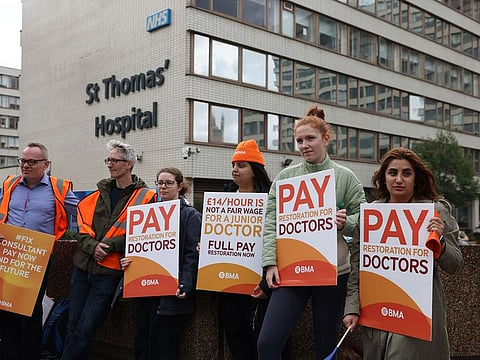What you need to know about UK’s failing health system
As long as Britain’s lethargic growth pace persists, NHS might remain on the sick list

Nearly 53,000 more people died in the UK last year above the normal rate of mortal attrition — the highest figure recorded in a non-pandemic year since the Second World War. These excess deaths coincided with 38 days of strikes by doctors over a prolonged pay dispute with the government as the state health service (NHS) struggled with the after-effects of Covid-19.
According to the same analysis by the Tory-supporting Daily Telegraph, Britain’s health-care record lagged behind every other developed country, America included, as of mid-October 2023. It can only get worse if the stalemate between the government and the doctor’s trade union, the British Medical Association (BMA), continues.
Recently junior doctors began another six-day walkout, the longest in the history of the NHS, staged at the busiest time in the year when flu outbreaks and other winter ailments reach their peak. More than 300,000 operations will be axed in London alone.
The NHS is caught in a death spiral. As waiting lists for treatment mount by the millions, fewer people bother to use the service. The lucky few will tap their private medical insurance to access doctor, but thousands more will avoid or miss a diagnosis for cancer, heart disease and other life-threatening conditions.
Waiting lists continue
After the holiday festivities, voters seem grimly resigned to their failing health service — they still overwhelmingly back the idea that the NHS should be free of charge when you use it.
In a speech at a Bristol electronics factory on Thursday, a shirtsleeves Keir Starmer, the leader of the opposition Labour Party, tried to turn the bleak public mood to his advantage. There is a “tide of cynicism in Westminster” and an “understandable despair of a downtrodden country,” he observed, due to Boris Johnson’s Partygate troubles, lobbying scandals and years of deteriorating public services.
As part of the “project hope” campaign he wants to fight all the way to the next general election, Starmer announced that Labour is “the party with a plan.” Does he have one for the nation’s health?
The feeble state of the NHS should be a winner for Starmer. The voters trust Labour’s track record. When the party, led by Tony Blair, last came to power in 1997, 50% of voters were dissatisfied with the NHS and only 34 per cent were satisfied, according to a British Social Attitudes (BSA) survey. When Labour left office in 2010 those figures were reversed — 70% expressed satisfaction, and only 18% were dissatisfied.
Money talked. The average annual increase in per capita health spending under the Tories from 1979 to 1997 was 2.03%. Under Labour it rose to 5.67%. Blair’s key objective was to reduce waiting lists and waiting times, and the BSA survey showed the voters noticed.
NHS stays on sick list
Today, waiting lists have increased to more than 7 million from 4 million. The last BSA survey in April showed that public satisfaction with the NHS fell to the lowest level ever recorded. Sixty per cent cited the reason that “it takes too long to get a general practitioner or hospital appointment.” Fifty-five per cent (correctly) observed that there were “not enough NHS staff” — long-term labour force planning has gone awry.
The Conservative government can’t shoulder all the blame: Satisfaction with the NHS was still high until 2019 when the pandemic struck and forced the postponement of operations and appointments. But strikes by doctors and nurses, unfilled vacancies and a lack of capital investment have exacerbated chronic problems.
Here is Starmer’s dilemma: Labour has at last won a narrow lead in the opinion polls over the Tories on the management of the economy. To win a reputation for financial probity, however, the leadership has been forced to stamp on most shadow cabinet proposals that increase taxes and spending. But no improvement in the NHS comes without a hefty price tag.
Reforms won’t pay for themselves — at least not for some years. Unless the economy outperforms its current sluggish growth rate, we may find that the NHS stays on the sick list. — Bloomberg
Martin Ivens is the editor of the Times Literary Supplement
Sign up for the Daily Briefing
Get the latest news and updates straight to your inbox



